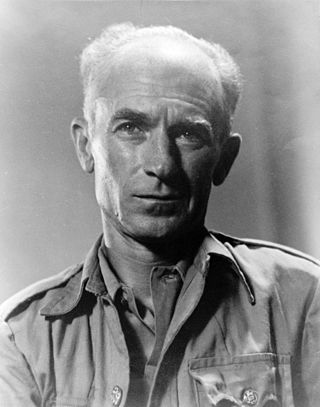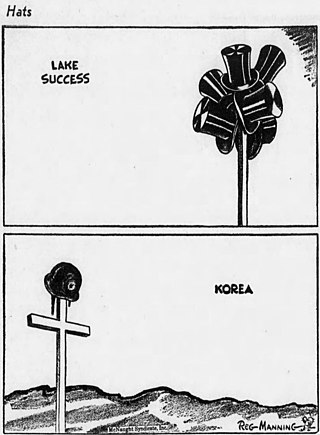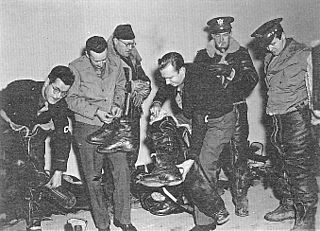Related Research Articles

United Press International (UPI) is an American international news agency whose newswires, photo, news film, and audio services provided news material to thousands of newspapers, magazines, radio and television stations for most of the 20th century. At its peak, it had more than 6,000 media subscribers. Since the first of several sales and staff cutbacks in 1982, and the 1999 sale of its broadcast client list to its main U.S. rival, the Associated Press, UPI has concentrated on smaller information-market niches.
The Chicago American was an afternoon newspaper published in Chicago, under various names until its dissolution in 1975.

Ernest Taylor Pyle was a Pulitzer Prize–winning American journalist and war correspondent who is best known for his stories about ordinary American soldiers during World War II. Pyle is also notable for the columns he wrote as a roving human-interest reporter from 1935 through 1941 for the Scripps-Howard newspaper syndicate that earned him wide acclaim for his simple accounts of ordinary people across North America. When the United States entered World War II, he lent the same distinctive, folksy style of his human-interest stories to his wartime reports from the European theater (1942–44) and Pacific theater (1945). Pyle won the Pulitzer Prize in 1944 for his newspaper accounts of "dogface" infantry soldiers from a first-person perspective. He was killed by enemy fire on Iejima during the Battle of Okinawa.

This Pulitzer Prize has been awarded since 1942 for a distinguished example of reporting on international affairs, including United Nations correspondence. In its first six years (1942–1947), it was called the Pulitzer Prize for Telegraphic Reporting - International.

Arnold Eric Sevareid was an American author and CBS news journalist from 1939 to 1977. He was one of a group of elite war correspondents who were hired by CBS newsman Edward R. Murrow and nicknamed "Murrow's Boys." Sevareid was the first to report the Fall of Paris in 1940, when the city was captured by German forces during World War II.

The Murrow Boys, or Murrow's Boys, were the CBS radio broadcast journalists most closely associated with Edward R. Murrow during his time at the network, most notably in the years before and during World War II.
Homer William Bigart was an American reporter who worked for the New York Herald Tribune from 1929 to 1955 and for The New York Times from 1955 to his retirement in 1972. He was considered a "reporter's reporter" and an "enduring role model." He won two Pulitzer Prizes as a war correspondent, as well as most of the other major journalism awards.

The following are the Pulitzer Prizes for 1951.

The Pulitzer Prize for Correspondence was awarded from 1929 to 1947.

The Writing 69th was a group of eight American journalists who trained to fly bomber missions over Germany with the U.S. Eighth Air Force during World War II.

Eric Lloyd Williams (1915–1988) was a South African-born journalist and war correspondent who covered World War II for the South African Press Association and Reuters.

Jack Belden was an American war correspondent who covered the Japanese invasion of China, the Second World War in Europe, and the Chinese Civil War in the late 1940s.

Choe Sang-Hun is a Pulitzer Prize-winning South Korean journalist and Seoul Bureau Chief for The New York Times.
Don Whitehead was an American journalist. He was awarded the Medal of Freedom. He won the 1950 George Polk Award for wire service reporting.

Vernon Arnold Haugland was an American reporter and writer for the Associated Press. As a war correspondent, he experienced and documented World War II events in person. During an assignment to New Guinea, he was a passenger in a bomber that ran out of fuel. He had to parachute out at 13,000 feet. Landing safely, he then spent 43 days in the jungle living off the land. He nearly starved to death, but for his heroism, General Douglas MacArthur awarded him the Silver Star medal. He was the first civilian to receive the medal – awarded at the time exclusively to members of the United States Armed Forces.

Sonia Tomara was a Russian-born journalist who is regarded as the first female war correspondent of World War II.
Relman George Morin was an American journalist who spent most of his career writing for the Associated Press, serving as bureau chief of its offices in Tokyo, Paris, Washington, D.C., and New York.
John Parsons O'Donnell was an American political journalist and analyst known for working for the New York Daily News.
References
- ↑ Unpublished war journal, Eric Lloyd Williams
- ↑ "Eric Lloyd Williams". Cape Times . February 12, 1944.[ dead link ]
- ↑ "New Zealand war correspondent G E Beamish in the Libyan desert during World War 2, [ca 3 Dec 1941]". National Library of New Zealand. 2015. Retrieved May 24, 2015.
- ↑ "Jack Belden, Journalist, 79". The New York Times . New York. June 6, 1989. ISSN 0362-4331 . Retrieved May 24, 2015.
- ↑ "Reporter Homer Bigart, famed war correspondent". Pittsburgh Press. April 17, 1991. Retrieved May 24, 2015.
- ↑ "Photograph of Sam Brewer". Archived from the original on June 10, 2011.
- ↑ Howse, Christopher (March 16, 2009). "Alan Whicker interview: a journey of a lifetime". The Daily Telegraph . London. ISSN 0307-1235. OCLC 49632006 . Retrieved May 24, 2015.
- ↑ "Details for Buckley, Christopher". The Freedom Forum Journalists Memorial. Archived from the original on October 28, 2004. Retrieved August 16, 2011.
- ↑ "Norman Clark: war correspondent and foreign editor for the News Chronicle". Press Gazette. August 25, 2004. Archived from the original on May 24, 2015. Retrieved May 24, 2015.
- ↑ David Halberstam (May 10, 2007). Breaking News: How the Associated Press Has Covered War, Peace, and Everything Else. Princeton Architectural Press. p. 226. ISBN 978-1-56898-689-0 . Retrieved May 24, 2015.
- ↑ "The Pulitzer Prizes: Telegraphic Reporting (International)". pulitzer.org. 2015. Retrieved May 24, 2015.
- ↑ "Daniel De Luce obituary". Milwaukee Journal Sentinel . January 31, 2002. p. 9B. Retrieved May 24, 2015.
- ↑ David Divine obituary, The Times , 2 May 1987
- ↑ "Robert Dunnett, a BBC Radio broadcaster covering the D-Day invasions". Getty Images. 2015. Retrieved May 24, 2015.
- ↑ Abilene Reporter-News (9 April 1943), p. 14; The Spectator (10 December 1943), p. 8.
- ↑ "Soldier of the Press: Covering the Front in Europe and North Africa, 1936-1943". Amazon.com. 2015. Retrieved May 24, 2015.
- ↑ "Army & Navy - HIGH COMMAND: Hero on Ice". TIME . August 3, 1942. Archived from the original on June 25, 2010.
- ↑ "Harold Guard (Author of The Pacific War Uncensored)". Goodreads.com. Retrieved April 25, 2015.
- ↑ Ramsay, Alan (April 26, 2008). "Mighty Moments In The Fray Filled Nation With Pride". Sydney Morning Herald . Retrieved May 24, 2015.
- ↑ "Distinguished journalist Hewitt dies". The Revolt and The Revolting. October 18, 2005. Retrieved May 24, 2015.
- ↑ Riess, Curt (1971). They Were There: The Story of World War II and how it came about. Books for Libraries Press. p. 637. ISBN 978-0-8369-2029-1 . Retrieved May 24, 2015.
- 1 2 Addley, Esther (January 17, 2004). ""A foreign affair": Clare Hollingworth". The Guardian . Retrieved May 24, 2015.
- ↑ Reference to Denis Johnston's autobiography Archived September 18, 2008, at the Wayback Machine
- ↑ Jordan, Philip (1943). Jordan's Tunis Diary. London: Collins.
Jordan also covered the Spanish civil war, other regions and parts of the Russian front prior to arriving in Tunis in November 1942.
- ↑ "Battle of Africa: Full Measure of Blood". TIME . February 15, 1943. Retrieved May 24, 2015.
- ↑ Lait, George (December 2, 1941). "Saviours of Britain". St. Petersburg Times. Retrieved May 24, 2015.
- ↑ Settel, Arthur (1950). This is Germany. Sloane. p. 422. ISBN 978-0-8369-2427-5 . Retrieved May 24, 2015.
- ↑ Martin, Frank (November 9, 1942). "Axis Air Force enters battle; Fighting rages in Casablanca, Algiers taken, Oran encircled". Ellensburg Daily Record. p. 1. Retrieved May 24, 2015.
- ↑ "Richard McMillan reporting from North Africa". Archived from the original on 2012-10-16. Retrieved 2010-02-28.
- ↑ Pace, Eric (January 12, 1990). "Drew Middleton of The Times Dies at 76". The New York Times . New York. ISSN 0362-4331 . Retrieved May 24, 2015.
- ↑ "Australian war correspondents Ronald Monson and D. Brass, Sicily, 1943". plus.google.com. 2015. Retrieved May 24, 2015.
- ↑ "Radio: Voice from Cairo". TIME. August 24, 1942. Retrieved May 24, 2015.
- ↑ "William Munday news story, December 22, 1942". Archived from the original on October 16, 2012. Retrieved February 28, 2010.
- ↑ O'Reilly, John (Tex) (April 1944). "My Beat was the Battlefield". Popular Science. Bonnier Corporation. 144 (4): 62–65. ISSN 0161-7370 . Retrieved May 24, 2015.
- ↑ "Edmund Stevens, 81, a Reporter In Moscow for 40 Years, Is Dead". The New York Times . New York. May 27, 1992. ISSN 0362-4331 . Retrieved May 24, 2015.
- ↑ "South Africans Tour District". The Pittsburgh Press . August 16, 1944. p. 26. Retrieved May 24, 2015.
- ↑ Tucker, George (November 9, 1942). "Summary of War in North Africa emphasizes its see-saw nature". The Montreal Gazette . p. 14. Retrieved May 24, 2015.
- ↑ "Combat Reporter: Don Whitehead's World War II Diary And Memoirs by John B. Romeiser". allbookstores.com. 2015. Retrieved May 24, 2015.
- ↑ Whitehead, Don; Romeiser, John Beals (2006). Combat Reporter: Don Whitehead's World War II Diary and Memoirs . Fordham University Press. p. 4. ISBN 978-0-8232-2675-7 . Retrieved May 24, 2015.
lloyd williams whitehead.
- ↑ Zinder, Harry (March 3, 1941). "Wavell: The hero of North Africa believes that a good general takes a gambler's chance to win "victory by a knockout"". LIFE . Time Inc. pp. 63–73. ISSN 0024-3019.